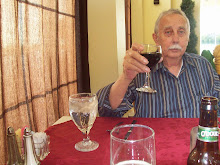One of the trends in the United States is for cities to spread so that in certain areas there is almost one continuous urban area for long distances. For example, on the East Coast from Boston through northern New Jersey is practically one long city. Again according to World Culture Report, four problems beset cities at this time: high unemployment, inadequately maintained infrastructure, environmental problems and social conflicts such as crime and homelessness. These trends are reflected in my novel of the future, Star Tower. Here is an excerpt. The protagonist, John Huck, has just returned from the space war as a dishonorably discharged veteran.
His weight increased slightly as the pilot fired braking thrusters. There was the fiery descent through the upper atmosphere and finally an increase in cabin pressure that hurt his ears as the ship passed through the cloud layer. He glanced out of his window. From horizon to horizon was Federation City, a million twinkling rainbow lights, some moving, some still. Glowing towers split the sky like a macrogiant's fairy castle. It was so enormous and beautiful, he choked up. The thought came to him that the teeming multitude who lived in this sea of jeweled splendor would never see it like this -- rubies, diamonds, emeralds and topazes for hundreds of miles along the Atlantic shore.
A few hours later he emerged from a filthy subway station and thought how false was that vision from a mile up. If the megalopolis was a jeweled fairyland from the air, at ground level it was a garbage-strewn, dark and dingy, troll cavern. From an ugly gray sky a heavy sulfur-laden rain swept discarded scraps of paper, cigarette butts, orange peelings, wilted lettuce leaves, condoms and other garbage in torrential streams along the gutter. Like canyon walls dark chipped concrete buildings, lower floors covered with graffiti, rose for fifteen or more stories. Huck shifted his bag to his other shoulder. With his head down against the icy downpour, he hurried down the dingy puddle-strewn sidewalk past doorways where shabby women and men huddled from the rain to stare sullenly at each passerby. They stood with arms wrapped around themselves and watched with hopeless eyes the dirty rain that fell into the gutter like their dreams. Others lay curled up or rested their heads on their knees with drug induced visions.
Some ragged children, a lone housewife and one elderly man with an umbrella braved the driving rain. Huck's eyes smarted and his nose twitched from the street's ugly odors, an unnatural fog of smoke, urine, bad cooking and other stomach churning fumes. He wondered how he had survived this awful place before he went to the space academy.
When he reached the more crowded commercial section, he was jostled by filthy, worn men and women some who had with open sores and dark diseased blotches on their faces, stumbled into by those who swayed with vacant drug-narrowed eyes and shoved aside by belligerent bands of youths who laughed at his grimace. He was well aware that these latter would like nothing better than for him to exhibit his annoyance. It would provide the excuse they needed to wield the iron pipes and bars they carried in clenched fists. He also knew that they concealed more potent weapons in their clothing.
But not everyone's vision of the cities in the future is so bleak. During National Engineer's Week, many cities hold a Future City competition. In a national competition, seventh and eight graders compete. Here are some of their ideas: A floating city complete with entertainment, recreation and medical center. A city powered by hydrogen. A domed city on Mars. Cities with environmentally friendly magnetically levitated trains. The things that these participants had to consider were water supply, public and private transportation local and long distance, entertainment and sport arenas, technology center, communications center, waste disposal and permanent open spaces such as parks and recreational facilities.
In my wandering around the web, I ran across two interesting sites. One was called The Venus Project where there was an article about Cities That Think. I have written short stories about a place called Automatia. In Automatia, everything was automated, and robots performed all the menial tasks. Of course, in my stories, when things went wrong, they went spectacularly wrong. In one, a man is trapped in his apartment when the machines stop working. In another, a misunderstood command causes robots to accidentally kill hundreds of people.
The most interesting web site I visited while researching this article was Future Past. It showed how futurists, visionaries, architects and science fiction writers in the twentieth century envisioned the city of the twenty-first. It's a hoot. Visit this site. You'll enjoy it.



No comments:
Post a Comment